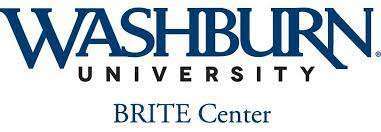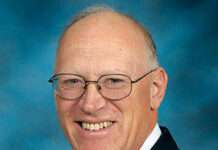With all of the challenges around us, would you like to hear about a bright spot for a change? Today we’ll learn about a new initiative which is indeed a bright spot – in fact, it is even named the BRITE Center. It is an innovative effort to help businesses grow, including exporting to international markets.
Under the direction of Laurie Pieper and Karl Klein, Washburn University has launched a new initiative called the BRITE Center. BRITE is an acronym for Business Resources for Innovation, Technology, and Exporting. Karl and Laurie are also director and assistant director, respectively, of the Washburn University Small Business Development Center or SBDC.
Karl is based in Topeka, and Laurie is based in Manhattan. Both had extensive small-business ownership experience before assuming their current roles.
The BRITE Center began in January 2021. “We’re seeking to address specific needs such as those of innovation and technology companies,” Laurie said. “We also want to deliver higher value services to businesses with the potential to export,” Karl added.
Part of the process is to assist businesses with pathways to commercialization. Pathways include moving technologies from university or industry research into commerce, moving products or services into national or international markets, and pursuing large government contracts. Commercialization refers to the process of introducing a new product or service into the commercial marketplace, particularly when aimed at large-scale growth potential.
Specifically, the BRITE Center provides team advising, educational events, program development, and partner engagement for businesses. “(The BRITE Center) will use SBDC services. This will also enable us to have more engagement with our university host,” Karl said. In this case, the university host is Washburn, so this creates opportunity for more students and faculty to be involved in developing educational content for programs.
“The SBDC already provides no-cost advising for small business to help entrepreneurs start and grow their businesses,” Karl said. “The SBDCs are part of a nationally accredited network, so people can know that this is a reliable resource,” Laurie added.
“Training is a big deal for us,” said Laurie, who also has a Ph.D. “I enjoy the education portion.”
The BRITE Center is an effort to take businesses to another level. “Our experience has helped us identify gaps and opportunities to do more with innovation, technology and exporting,” Karl said. “We want to help businesses navigate to commercialization.”
“Only about 1% of Kansas small businesses are exporters,” Laurie said. “The world needs our innovations, in areas such as animal health; protecting soil, water, and air; and helping feed the world. We want to strategically grow these sectors as well as other technologies to create jobs and generate wealth for the area.”
Urban centers often are seen as locations of innovation and technology. “We also want to do outreach to rural communities and support ag innovations,” Laurie said. In order to support such outreach, the SBDC has an additional office beyond the offices in Topeka and Manhattan. That office operates in partnership with the Glacial Hills Resource and Conservation District in northeast Kansas. The office is located in the rural community of Wetmore, population 368 people. Now, that’s rural.
“We’re trying to create something that’s sustainable and adds value to Kansas businesses,” Laurie said. “We’ve been very pleased with the enthusiasm that we’ve heard from our resource partners.”
“We want to be a catalyst, a conduit that helps connect the dots,” Karl said. “We’re open to work with regional and state partners.” The BRITE Center is currently working with resource partners to identify businesses with high potential for exporting.
“Think about the new methods of communication which exist now,” Karl said. “The world has changed,” Laurie added. “We believe there are more opportunities for people to be innovators.”
For more information, see www.wubritecenter.com.
With all the challenges around us, it’s good to find a bright spot. We commend Karl Klein, Laurie Pieper, and all those involved with the BRITE Center for making a difference with this new initiative to support exporters and other businesses. I think it is a bright idea.
Audio and text files of Kansas Profiles are available at http://www.kansasprofile.com. For more information about the Huck Boyd Institute, interested persons can visit http://www.huckboydinstitute.org.
FOR PRINT PUBLICATIONS: Links used in this story
Washburn University BRITE Center: www.wubritecenter.com
The mission of the Huck Boyd National Institute for Rural Development is to enhance rural development by helping rural people help themselves. The Kansas Profile radio series and columns are produced with assistance from the K-State Research and Extension Department of Communications News Media Services unit. A photo of Ron Wilson is available at http://www.ksre.ksu.edu/news/sty/RonWilson.htm. Audio and text files of Kansas Profiles are available at http://www.kansasprofile.com. For more information about the Huck Boyd Institute, interested persons can visit http://www.huckboydinstitute.org.
K State Research and Extension is a short name for the Kansas State University Agricultural Experiment Station and Cooperative Extension Service, a program designed to generate and distribute useful knowledge for the well being of Kansans. Supported by county, state, federal and private funds, the program has county extension offices, experiment fields, area extension offices and regional research centers statewide. Its headquarters is on the K State campus in Manhattan. For more information, visit www.ksre.ksu.edu
Column by:
Ron Wilson
rwilson@ksu.edu
785-532-7690





